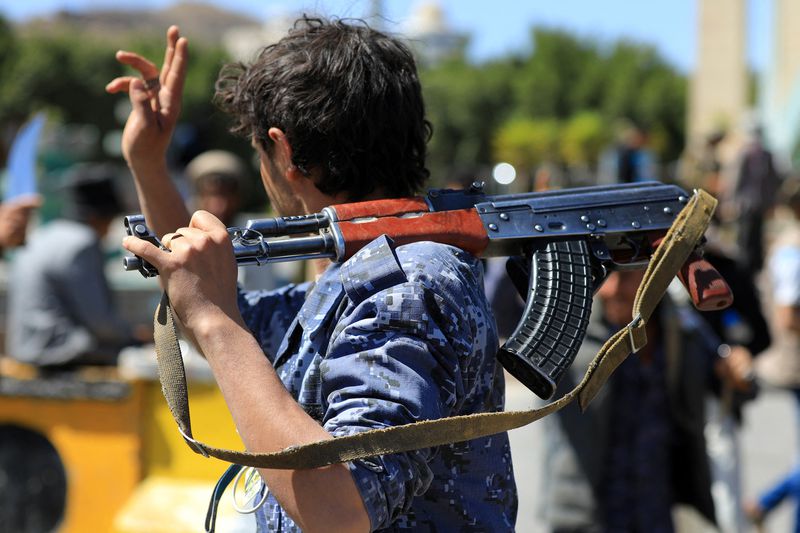This article appeared in New York Daily News on March 8th, 2022. Click here to view the original article.
Ukraine’s ongoing tragedy is now having dangerous ramifications in the Middle East, fueled by significant Biden administration policy failures. The United Arab Emirates, normally a staunch American ally, abstained recently on a UN Security Council resolution condemning Russia’s invasion. The reason: President Biden declined to relist Yemen’s Houthi rebels, who had repeatedly attacked civilian targets in the UAE and Saudi Arabia, as a foreign terrorist organization. Biden had earlier removed the Houthis, Iran’s surrogates in Yemen’s civil war, from the list, purportedly to mitigate Yemen’s sustained humanitarian crisis.
The UAE pressed to reverse Biden’s delisting after early February Houthi attacks on civilian targets in the UAE and Saudi Arabia, but the White House failed to act.
When Biden pressured the UAE, now a non-permanent Security Council member, to support his anti-Russia resolution, the UAE abstained instead. Embarrassing Biden reversals also include initially waiving, and now supporting, sanctions on the Nord Stream 2 Russia-to-Germany gas pipeline, which may have encouraged Moscow’s aggression.
Bumbling the Houthi threat reflects Biden’s profound misperceptions about what constitutes a serious menace to Middle East and global peace and security. Houthi strikes against civilian targets and threats to international shipping in the critical Bab-el-Mandeb Strait are, unfortunately, nothing new. Using missiles and drones, Houthi attacks increased markedly since mid-2019, along with increased Shia militia attacks on U.S. personnel in Iraq. These dangers would not exist without Iranian weapons shipments, training, targeting and logistics.
Because of the Yemen civil war’s complex politics, deeply-rooted underlying causes and resistance to solution, outsiders often focus on the hardships the conflict has caused. While severe and enduring, these hardships hardly explain the conflict’s causes or who is culpable. Instead, pre-existing hostility toward Saudi Arabia and the UAE, unrelated to Yemen, have colored outside judgments. The Houthis played the “victim card,” and sympathetic Westerners were duped.
Biden announced he was ending American support for the Saudi war effort in Yemen in hopes of ending the conflict, although that military support ad already been considerably reduced. Nonetheless, the Houthis continued their military efforts without evincing any real interest in resolving the conflict.
Unsurprisingly, therefore, Iran has largely escaped condemnation for meddling in Yemen, and for using the war to establish strategic positions literally in the backyards of its Arab enemies. Eliminating Tehran’s support to the Houthis would help end Yemen’s fratricide, and, equally importantly, end threats to commercial airports, oil infrastructure and other targets where innocent civilians live and work. Major airports are not far from urban population centers, and the reckless use of highly destructive weapons could easily cause mass-casualty events.
The Iran-Houthi alliance is almost entirely terrorist in its aims and methods. From its birth, Iran’s regime was a state sponsor of terrorism, so designated by Ronald Reagan in 1984. The Trump administration named the Iranian Revolutionary Guard Corps, Tehran’s external military arm, to the foreign terrorists’ list in 2019. Iran’s ayatollahs have consistently pursued terrorism, from seizing U.S. hostages in 1979 to aiding Hamas, Hezbollah and Iraqi militias, and threatening Americans worldwide.
Even so, the Biden administration is still begging Iran to revive the 2015 nuclear deal, an agreement fatally flawed from the outset, and getting worse with age.
The Houthis and their top leaders are also terrorists, as their behavior both inside Yemen and regionally amply demonstrates. As with the IRGC, the only legitimate complaint is that the U.S. government didn’t designate them as a foreign terrorist organization earlier. The designation expressly provided ways to ensure it did not impede delivery of humanitarian assistance to Yemeni civilians, UN protestations to the contrary notwithstanding.
Accordingly, while Yemen’s conflict remains complex and difficult, and not easily solvable, Iran’s presence is totally self-interested. It is not about Yemen, but about Iran’s efforts to achieve regional and religious hegemony through its own terrorism, assistance to terrorist groups and its pursuit of nuclear weapons and ballistic missiles.
Unless and until Americans understand this reality, grave humanitarian challenges in Yemen will persist, and gullible Westerners will still believe they can make a viable agreement with Iran to limit its determined quest for nuclear weapons. But even if Houthis are returned to the foreign terrorist organization list, it is unclear the Biden administration understands these larger points.
Bolton is a former U.S. ambassador to the UN and former national security adviser.
